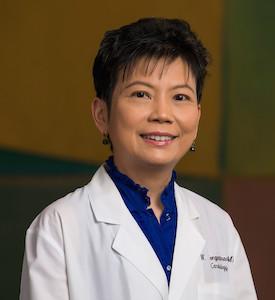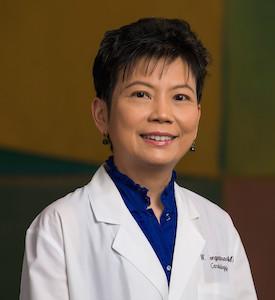
Credit: UT Southwestern Medical Center
DALLAS – Nov. 9, 2016 – African-Americans have more rigidity of the aorta, the major artery supplying oxygen-rich blood to the body, than Caucasians and Hispanics, according to a study by UT Southwestern Medical Center cardiologists.
The finding is important because African-Americans are the group at greatest risk of high blood pressure and organ damage caused by high blood pressure, and aortic rigidity is associated with high blood pressure.
The study examined data from some 2,500 participants in the Dallas Heart Study, a multi-ethnic population-based cohort. The researchers used two methods to assess stiffness of the aorta, which is the largest artery in the body, running from the top of the left ventricle in the heart down to the abdomen. Both systems of measurement found greater stiffness in the aortas of African-Americans.
"Our demonstration of ethnic differences in arterial stiffness is an important step in understanding the mechanisms that mediate ethnic differences in cardiovascular disease," said Dr. Wanpen Vongpatanasin, Professor of Internal Medicine at UT Southwestern Medical Center, and co-senior author of the study, which appears online in the Journal of the American College of Cardiology: Cardiovascular Imaging.
Hispanics in the study had an intermediate level of aortic stiffness, greater than Caucasians, but less than that of African-Americans.
The study found that both African-Americans and Hispanics had smaller diameter aortas, after adjustments were made for weight.
"This finding suggests that there may be a mismatch between aortic diameter and adiposity, which contributes to the increased rigidity," said Dr. Vongpatanasin, who holds the Norman and Audrey Kaplan Chair in Hypertension and the Fredric L. Coe Professorship in Nephrolithiasis in Mineral Metabolism.
Other possible mechanisms underlying the increased levels of aortic stiffness in African-Americans and Hispanics include greater sodium intake among African-Americans and Hispanics, lower intake of potassium, and genetic differences in collagen content. Collagen is a protein fiber that is a key component of connective tissue such as bone and artery walls.
According to figures from the Centers for Disease Control and Prevention, 43 percent of African-American men and 45.7 percent of African-American women have hypertension, or high blood pressure, compared with 33.9 percent of Caucasian men and 31.3 percent of Caucasian women.
"Hypertension is strongly associated with heart attack and stroke. Our study provides a potential explanation for excess risk of hypertension and resultant organ complication in African-Americans, who are at particularly high risk of cardiovascular disease," said Dr. Vongpatanasin.
The Dallas Heart Study is an ongoing, multi-ethnic epidemiologic study, funded by the Donald W. Reynolds Foundation. More than 6,000 individuals in Dallas County have participated in the study, which has led to more than 200 published papers and key findings about heart disease, cholesterol, and liver disease.
###
Other UT Southwestern researchers who contributed to this study are Dr. Christopher Maroules, Assistant Instructor; Colby Ayers, Faculty Associate; Dr. Roderick McColl, Associate Professor; Dr. Ronald Peshock, Professor of Radiology and Internal Medicine; and Dr. Akshay Goel, former UT Southwestern fellow.
This works was supported by a grant from the Doris Duke Charitable Foundation, National Center for Advancing Translational Sciences, National Institutes of Health, and from UT Southwestern's George M. O'Brien Kidney Research Core Center. Aortic rigidity
- The aorta is a large, candy cane-shaped artery extending upward from the top, left chamber of the heart then curving down and running in front of the backbone to the abdomen. It is the main pipeline for the flow of blood from the heart to the rest of the body.
- When the aorta is stiffer, or less "compliant," the large blood vessel cannot expand and rebound well as the heart contracts and relaxes, which means the heart has to work harder to pump blood throughout the body.
- Aortic stiffness is associated with cardiovascular disease, including heart attack, stroke, and heart failure, which is the inability of the heart to pump sufficient blood to supply oxygen to the body.
SOURCE: National Institutes of Health
About UT Southwestern Medical Center
UT Southwestern, one of the premier academic medical centers in the nation, integrates pioneering biomedical research with exceptional clinical care and education. The institution's faculty includes many distinguished members, including six who have been awarded Nobel Prizes since 1985. The faculty of almost 2,800 is responsible for groundbreaking medical advances and is committed to translating science-driven research quickly to new clinical treatments. UT Southwestern physicians provide medical care in about 80 specialties to more than 100,000 hospitalized patients and oversee approximately 2.2 million outpatient visits a year.
Media Contact
Cathy Frisinger
[email protected]
214-648-3404
@UTSWNews
http://www.swmed.edu





